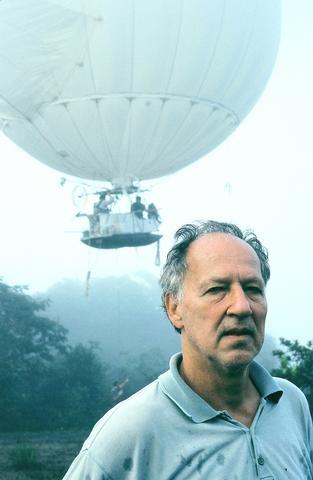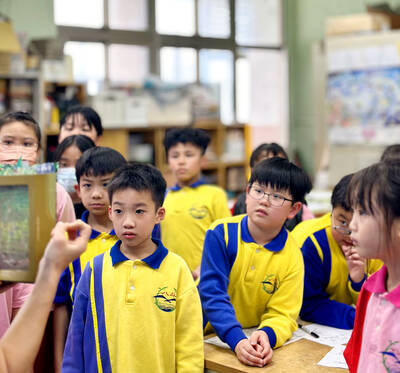Anyone who has seen Werner Herzog's Aguirre: The Wrath of God will immediately recognize the images of the German director's latest film The White Diamond, a documentary that was also filmed in the lush jungle of Guyana.
In this documentary, the forest looms as a haunting presence, a backdrop appropriate to the story of loss, tragedy and eventual victory.

PHOTO COURTESY OF TIDF
The story that Herzog has focused on is the work of a mildly eccentric British aeronautic engineer, Graham Dorrington, who has invented an airship that resurrects the design of early 20th-century zeppelins on a smaller scale to create a craft capable of hovering at the level of the jungle canopy at slow speeds and in relative silence.
His objectives for the creation are to allow deeper research into the diverse flora of the forest canopy, a potential biotechnology goldmine. On watching Dorrington's wide-eyed, breathless presentations of his aircraft, however, one develops the sneaking sense that he is primarily interested in aviation in its own right.
That ambition is clearly a source of immense motivation for Dorrington, yet it is also the reason for his deep sadness, as a similar design of the craft shown in the film had been used 10 years earlier in Sumatra and resulted in the tragic death of his friend, Dieter Plage.
The German cinematographer fell to his death in what was an unavoidable accident unrelated to any design flaw on Dorrington's part. Nevertheless, the professor bears his sorrow over the death quite openly. The experiments with the new craft, it seems, are an attempt to surmount that pain and loss and, perhaps, bring some meaning to Plage's death.
On site in Guyana, Herzog stumbles upon a parallel story of loss and longing in the character of local Rastafarian Mark Anthony, a diamond miner who is a hired hand in the professor's project. Anthony quietly and placidly reveals to Herzog the story of the loss of his family -- eight brothers, two sisters and his mother -- who have all emigrated to Spain and who he wishes to see more than anything else.
As Anthony watches the professor undertake test flights of the craft, he muses how he would like to fly the craft over the Atlantic Ocean and land on his family's roof in Malaga, Spain, and say to them, "Hello, I am home." Ultimately, there are two heroes in the film, Dorrington and Anthony. Dorrington overcomes his ghosts and past failures by fine-tuning his craft and successfully flying it around the jungle canopy with Herzog, who comes along for the ride to film.
Anthony, meanwhile, presents a figure of strength and perseverance, as well as deep wisdom. At one point, when Herzog poses an unusually banal question to him, Anthony flatly replies, "I cannot hear you for the thunder that you are," effectively brushing off the director. He is clearly deeply appreciated by the crew for his composure and his optimism in the face of hardship. Finally, he's offered a ride, after which he comments that his only regret was that his pet rooster wasn't able to join him.
As in Aguirre, the jungle offers up some spectacular images that, when accompanied by the eerie soundtrack, compound a sense of mystery and foreboding. The tone raises the suspense of the film, as we are gradually told of the details of Plage's death and begin to fear a possible repeat of the tragedy with the new craft.
Dorrington's apparent casual attitude toward procedure and safety provides ample reason to suspect that such could be the project's eventual conclusion.
But the enduring allure of flight, symbolized by the film's images of the forest's swift birds, and the strength of ambition fused with ingenuity and hope see the project through to its spectacular ending.
白鑽石
韋納荷索德
/日/英
這部片子是關於荷索一次探索亞馬遜叢林的冒險之旅。他與飛船工程師葛雷朵靈頓博士乘坐嶄新發明的氫氣飛船,前往圭亞那內陸氣勢磅礡的凱特瀑布區,滿載創造的夢想飛躍叢林頂端,二十年前朵靈頓的同僚友人在類似的冒險之中不幸墜地身亡。這次荷索隨同朵靈頓探索亞馬遜這片美麗誘人的祕境,進入當年拍攝經典名作《天譴》與《費滋卡拉度》的失落天堂,荷索將以這部獨特的影片記錄並訴說非凡的冒險故事。

May 26 to June 1 When the Qing Dynasty first took control over many parts of Taiwan in 1684, it roughly continued the Kingdom of Tungning’s administrative borders (see below), setting up one prefecture and three counties. The actual area of control covered today’s Chiayi, Tainan and Kaohsiung. The administrative center was in Taiwan Prefecture, in today’s Tainan. But as Han settlement expanded and due to rebellions and other international incidents, the administrative units became more complex. By the time Taiwan became a province of the Qing in 1887, there were three prefectures, eleven counties, three subprefectures and one directly-administered prefecture, with

It’s an enormous dome of colorful glass, something between the Sistine Chapel and a Marc Chagall fresco. And yet, it’s just a subway station. Formosa Boulevard is the heart of Kaohsiung’s mass transit system. In metro terms, it’s modest: the only transfer station in a network with just two lines. But it’s a landmark nonetheless: a civic space that serves as much more than a point of transit. On a hot Sunday, the corridors and vast halls are filled with a market selling everything from second-hand clothes to toys and house decorations. It’s just one of the many events the station hosts,

Two moves show Taichung Mayor Lu Shiow-yen (盧秀燕) is gunning for Chinese Nationalist Party (KMT) party chair and the 2028 presidential election. Technically, these are not yet “officially” official, but by the rules of Taiwan politics, she is now on the dance floor. Earlier this month Lu confirmed in an interview in Japan’s Nikkei that she was considering running for KMT chair. This is not new news, but according to reports from her camp she previously was still considering the case for and against running. By choosing a respected, international news outlet, she declared it to the world. While the outside world

Through art and storytelling, La Benida Hui empowers children to become environmental heroes, using everything from SpongeBob to microorganisms to reimagine their relationship with nature. “I tell the students that they have superpowers. It needs to be emphasized that their choices can make a difference,” says Hui, an environmental artist and education specialist. For her second year as Badou Elementary’s artist in residence, Hui leads creative lessons on environmental protection, where students reflect on their relationship with nature and transform beach waste into artworks. Standing in lush green hills overlooking the ocean with land extending into the intertidal zone, the school in Keelung